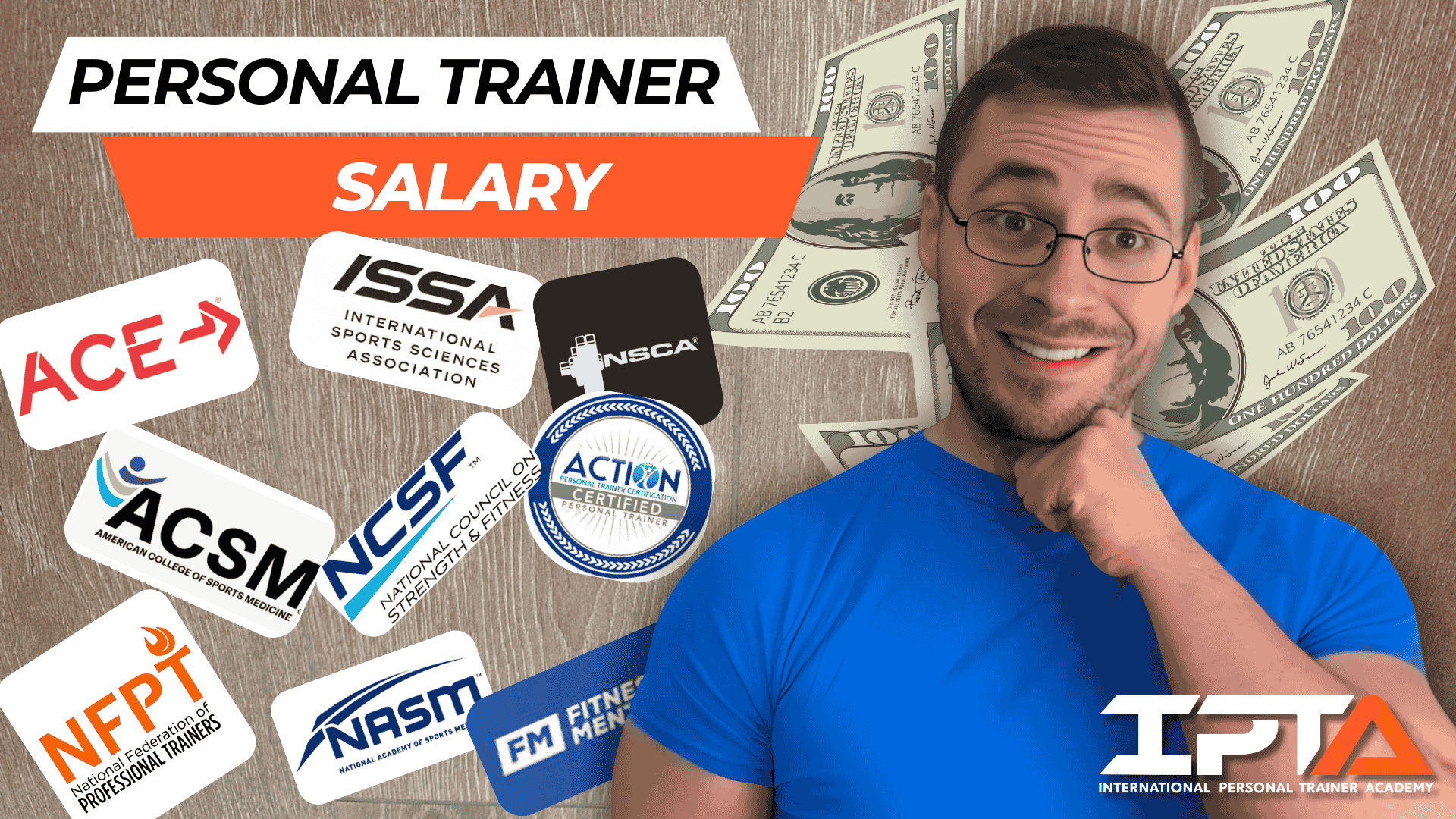
Strength and conditioning coaches are among the top of the fitness industry, so it makes sense to join the field.
As a strength and conditioning coach, you will focus on training the upper echelon of clients and learn how to train athletes.
In this article, I’ll discuss the following steps to jumpstart your future career as a strength coach:
- Strength and conditioning coach requirements
- Top strength and conditioning certifications
- The ins and out of the certification exams
- Putting together your resume and applying for jobs
- Continuing education units
After reading this article, you will be able to decide on how you will start the process of becoming a strength coach, along with the further steps needed.
Let’s dive in and check out the most interesting career in fitness!
Exclusive TA Offers |
||
Most Popular Cert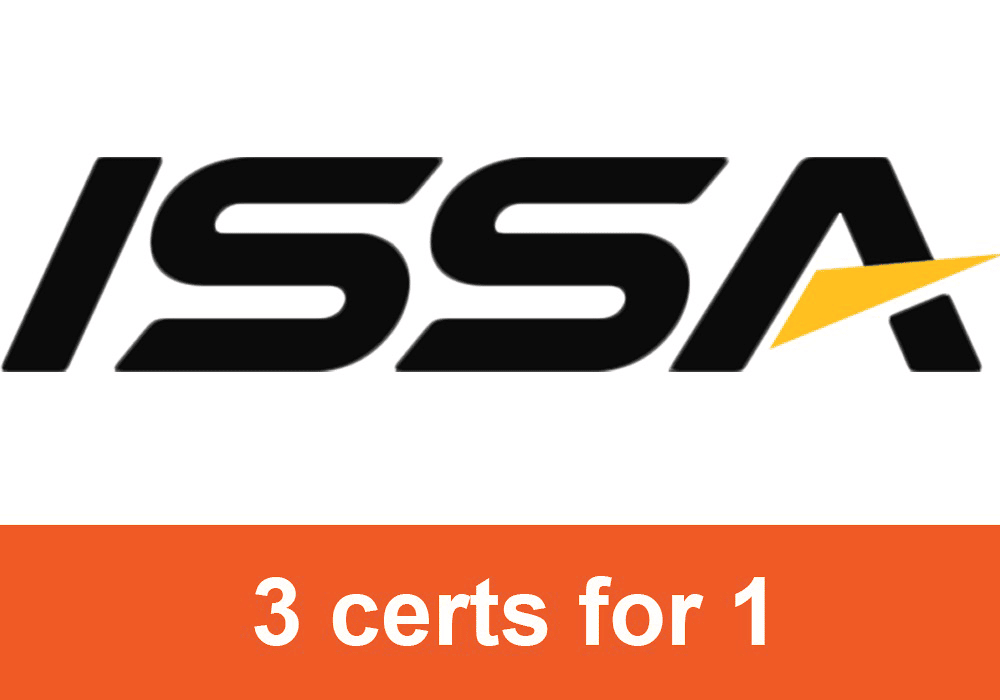
| Great Option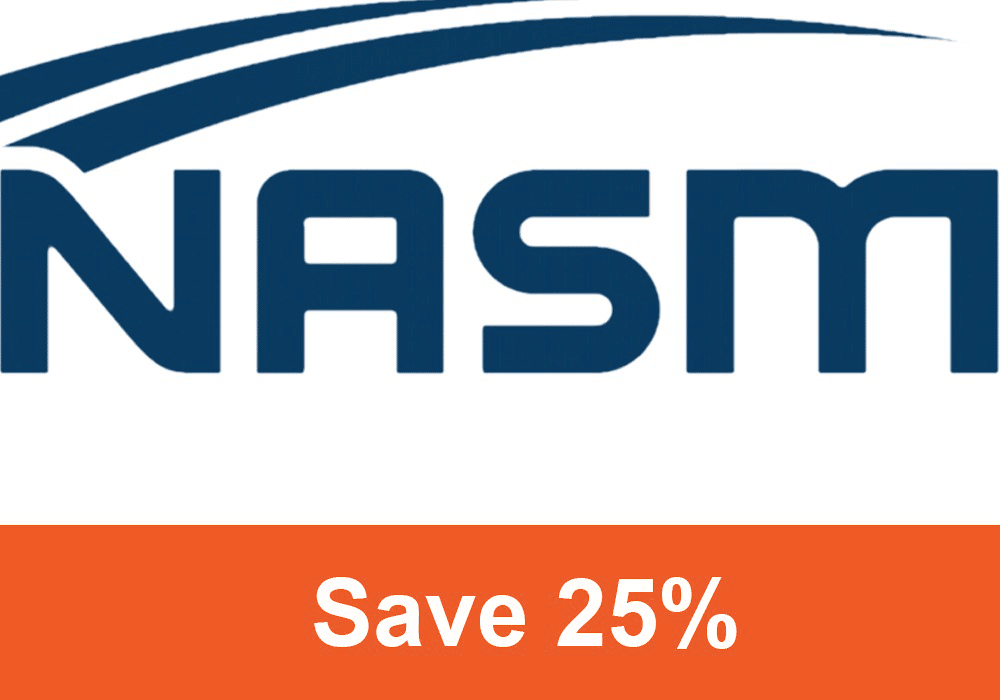
| Best Cert for you? 
|
Good Option
| Good Option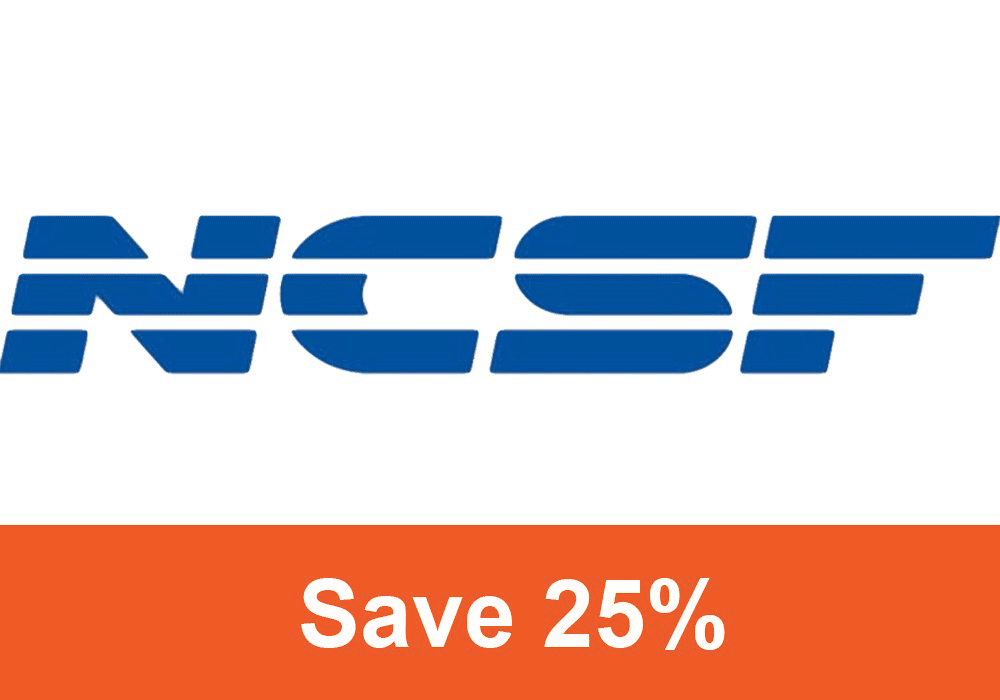
| Good Option
|
Step 1: Prerequisites / Choose Certification
Learning how to become a strength and conditioning coach begins with knowing the relevant prerequisites for the job.
The strength and conditioning field stands somewhat higher in the prerequisites than other fitness certifications.
This is due to the strength and conditioning professionals working on the athletic populations, thus requiring even more advanced and fine-tuned knowledge for optimal performance.
As I hinted, this job is unique in fitness, as most of the time, the hiring company will require a bachelor’s degree.
A master’s degree may even be required for some specific strength coach jobs with elite athletes in a college setting.
Aside from choosing and obtaining your strength and conditioning certification, here are some other main prerequisites you will see!
Check here: How to Become a Personal Trainer
Age
This is the first and easiest prerequisite to remember and stays true for all of the organizations here.
You must be 18 years of age minimum, and most will be older when considering these strength training certs, as they will need education past high school for the average strength coaching job.
The age requirement allows the candidates for certification to be more responsible and be able to develop the skills considered to be best for basic, independent life.
For a solid educational read, check out: Exercise Science Careers
Education
This is a vital prerequisite, as the sports performance training field and working with collegiate strength training programs requires a good amount of knowledge, communication skills, and personal experience.
While not all certifications will require college experience to acquire, employment opportunities will usually have this requirement.
So, it is something to keep in mind when researching for that dream job.
It can be possible to work on both a strength and conditioning cert while pursuing or nearing the end of your bachelor’s degree.
Most often, the degree is not needed to be in an exercise science field.
Primary Responder Certifications
Jobs will require similar certifications to other fitness careers.
There is a degree of medical risk that comes along with training clients, directing exercises, and having any kind of physical activity.
There is also a potential for many forms of injury, no matter how hard you prepare and what population you work with.
You will need to show that you are prepared for these situations with a certificate in three different areas, sometimes all included on one certificate.
To show preparation for these worst-case scenarios, the exercise professionals will need to be certified in First Aid, CPR, and AED. These certifications will need to remain current when applying for jobs.
CPR is Cardiopulmonary Resuscitation, and AED stands for Automated External Defibrillator.
Aside from being CPR certified and AED certified, there may also be a requirement for insurance in the form of liability insurance for training individuals.
Passion!
Becoming a strength and conditioning coach and being successful at it will require a passion for the career.
In order to instill a passion for health, fitness, and wellness, you must have this same passion.
Athletic trainers will be working with individual athletes and conditioning programs for the attainment of athletic performance enhancement and weightlifting.
It is important that anyone on the career path of strength training show passion for their career so that they may keep their athletes and clients successful.
Passion also includes living by the things you are teaching!
It is doubtful that student-athletes, or whoever may be your clients, will be passionate when their sports coach doesn’t live by their own teachings.
If you are out of shape, out of breath in your workouts, and don’t eat well, then it will not bode well in the passion department.
This is an absolutely essential part of all strength and conditioning jobs. Make sure to practice the things you preach.
An important read: The Best Nutrition Certifications
Choose Your Certification
If the certifying agency does not specify the need for a degree, it will just require a high school diploma and an existing personal training certificate.
Again, some of these will require the acquisition of a bachelor’s degree to be considered as a candidate for their program. It can also be a good idea to have your bachelor’s degree in kinesiology or a related field.
A thing to consider with the certifications is their accrediting agency, which will be through either the NCCA or the DEAC.
The NCCA, short for National Commission of Certifying Agencies, and the DEAC, short for Distance Education Accrediting Commission, are both excellent certifying organizations.
This accreditation is a certificate for the certificate, in essence. This lets you know that the certification you pursue is of quality.
Accreditation informs you that the certification is up to standards when it comes to:
- Quality and relevance of the content
- Meeting industry standards
- Having the correct recognition and acceptance
- Administering the training and certification within approved and standardized protocols
Here is a chart showing the accreditations for these five main certs that follow. Keep this in mind when deciding which certification is best for you.
Strength and conditioning
| Certification | Accreditation |
|---|---|
| ISSA Strength and Conditioning Certification | DEAC |
| NSCA Certified Strength and Conditioning Specialist | NCCA |
| NCSF Strength Coach | NCCA |
| NASM Performance Enhancement Specialist | NCCA |
| CSCCa Master Strength & Conditioning Coach | NCCA |
The biggest note here is that the ISSA SCC is the only one not accredited with the gold standard NCCA. But, it is still accredited by the DEAC, which is a great organization.
No matter which one you choose, you will have a quality certification to run a successful strength and conditioning coaching program.
Go through the main certifying organizations within the fitness industry below and get an idea of which strength and conditioning coach certification you would prefer. Keep the aforementioned accreditation aspects in mind, also.
There will be a few more opportunities to see comparisons between the certifications outside of step 1, but this will be good to get the main idea of these certifications.
Exclusive TA Offers |
||
Most Popular Cert
| Great Option
| Best Cert for you? 
|
Good Option
| Good Option
| Good Option
|
NSCA Certified Strength and Conditioning Specialist

The NSCA, or National Strength and Conditioning Association, is considered the gold standard of strength training credentials.
The NSCA CSCS certification is an excellent investment for someone looking to work with the top athletes and sports teams, eventually beyond the scope of an assistant strength and conditioning coach, at the collegiate or professional level.
Examples include, but are not limited to, the following job title:
- MLB Strength and Conditioning Coach
- NBA Strength and Conditioning Coach
- NFL Strength and Conditioning Coach
When it comes to CSCS internships and job opportunities, the NSCA CSCS is likely considered the top dog amongst employers and fitness professionals alike.
With these excellent qualities and the high reputation mentioned comes a challenging and more in-depth exam process which could be a deterrent for most.
As an organization, NSCA makes the most challenging tests for all of its certifications, and this is why they are so highly renowned.
For those of you who want to take your studying to the next level, I suggest the premium NSCA MVP study system, which has a 99% pass rate and a money-back exam pass guarantee.
ISSA Strength and Conditioning Certification

The ISSA, or the International Sports Sciences Association, is one of the leading agencies and has been for over 30 years.
The organization is one of the best in the fitness industry, but its strength and conditioning certification is not as well known by fitness professionals.
This program is definitely up to par with the more serious organizations like the CSCCa and NSCA CSCS.
If your goal with strength and weight training is mostly with the general population rather than a college with sports teams, then this is probably one of the best CSCS courses for you.
Also, if you don’t have a bachelor’s degree or higher this is your best option as you need a BA in an exercise related field to get the CSCS.
If the value is your concern, you should definitely opt for ISSA and the elite trainer package to get the combination of personal training, strength and conditioning, and nutrition.
Having these three certifications together would make you a better one-on-one trainer!
And you will definitely be equipped with essential skills to succeed in your unique fitness career.
NCSF Strength Coach
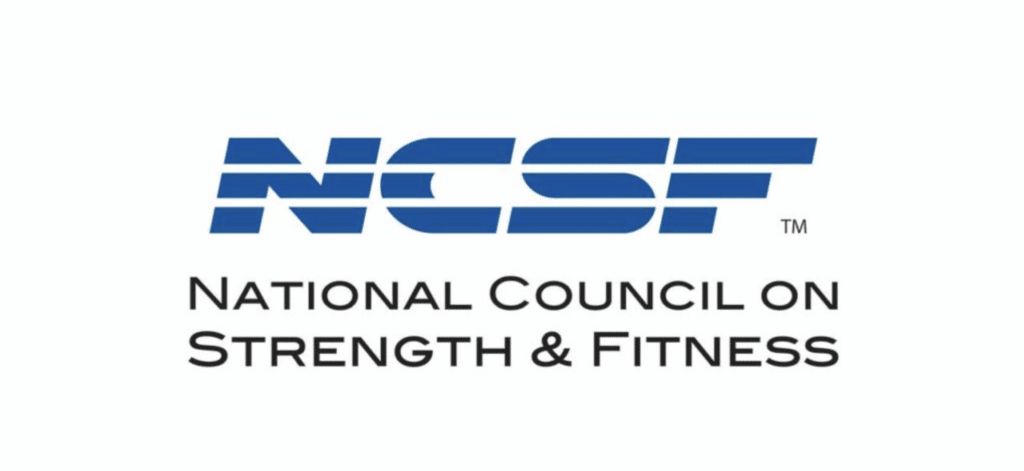
The NCSF is a popular certifying agency in the fitness realm and growing strong in the personal training certification categories.
The National Council on Strength and Fitness is accepted by most employers and is another one of the top NCCA-accredited certifications in terms of value and the ability to work with a wide range of athletic clients.
And, for those of you who want to take your studying to the next level, I suggest the premium NCSF MVP study system, which has a 99% pass rate and a money-back exam pass guarantee.
A qualitative piece: The Best Fitness Certifications
NASM Performance Enhancement Specialist

The National Academy of Sports Medicine (NASM), is perhaps the most well-known and recognized organization on this list.
While the NASM PES is not the gold standard of the strength and conditioning industry, it is, without a doubt, one of the most convenient.
This is due to there being no need to recertify after a certain number of years.
As far as fitness certifications go, NASM is known for its personal trainer program and the many additional certifications and specializations that go along with its CPT, such as the NASM Nutrition certification.
There’s also a free NASM study guide and free NASM practice test you can use to study.
There’s a plethora of NASM exam information available, and if it’s up for grabs, go for it!
And, for those of you who want to take your studying to the next level, I suggest the premium NASM MVP study system, which has a 99% pass rate and a money-back exam pass guarantee.
Want to explore other programs?
For general personal trainers, the American Council on Exercise (ACE) is another great name.
To see how I compare the two certifications, see my NASM vs. ACE review.
Also, check the ACE study guide and ACE practice test while you’re at it, too.
In addition, I even compared NASM vs. ISSA and NASM vs. NSCA for your convenience.
CSCCa Master Strength & Conditioning Coach

Finally, there’s the Collegiate Strength and Conditioning Coaches Association (CSCCa).
This is the ultimate strength and conditioning certification, as it is reserved for the most experienced and knowledgeable exercise professionals.
This strength certification has some intense requirements, one of which is the need for 12 years of full-time related work experience in the field of strength and conditioning prior to even applying.
While this makes it quite unrealistic for someone looking to become a strength and conditioning coach, it is a good goal to shoot for once you have met the basic requirements.
Certification Costs
Take a look at the breakdown for each CSCS cost in the table below.
Strength and conditioning cert costs
| Certification | Cost (cheapest option) |
|---|---|
| ISSA Strength and Conditioning Certification | $1,398 |
| NSCA Certified Strength and Conditioning Specialist | $475 (non-member) $340 (member) |
| NCSF Strength Coach | $349 |
| NASM Performance Enhancement Specialist | $899 |
| CSCCa Master Strength & Conditioning Coach | $470 |
According to the table, the CSCCa is the cheapest, but this is because it is only an exam and, of course, still requires 12 years of experience to get it.
The NSCA and NSCF are also exam-only options here, but they offer more options and packages when purchasing. The chart just refers to the entry-level prices.
The NSCA, which is considered the best strength and conditioning option, has a membership option which makes it dependent on whether you desire to be a member or not.
The ISSA is the most expensive option here, at a value of $799.
However, you can get more value with the ISSA elite trainer package, which comprises the personal training certification, nutritionist certification, and any other certification of your choosing at a value of $999.
NASM has the most expensive option of all if you look at their all-inclusive package, but it’s not put into the chart.
With that all having been said, it is important to view each organization directly to see the current pricing, as there are often deals and other factors that come into play.
Now that you have gone through the basics of the most popular strength coach certifications, let’s move on to step 2.
Step 2: Studying and Exam Preparation
The next step is perhaps the longest in your road to strength and conditioning coach jobs and employment.
In this section, I’ll rate the study materials for each certification and discuss some ways to assist you in your preparation and quest on how to become a CSCS.
When you have finally purchased the materials for your desired strength and conditioning coach-certified program, it is then time to begin the process of learning said materials.
How long does it take to become certified?
This is entirely up to you and depends on a multitude of things, such as educational background, experience, education, and more.
Each program will explain to you how to qualify, how to obtain CSCS certifications, and even how to gain experience.
Overall, the courses from all of these organizations will include pretty much each of these material sets for you to learn with.
Let’s dive into these!
Course Textbook
The textbook is your primary source of study and where all of the information needed for passing your certification exam is held.
Make sure to read this information thoroughly and make use of some of the next study materials mentioned.
Setting up a study program to follow and using quizzes and practice tests during your entire time with the textbook is essential for mastering the amount of information within each strength and conditioning certification.
It also improves your organizational skills, which are crucial for the job, for sure.
Practice Tests/Exams/Quizzes
Practice tests, practice exams, and quizzes are often offered to some degree by the organization you choose.
It is important to use this not only for mastering the information but for preparing for the styles of questioning that you will run into on the final certification exams.
These forms of practice testing can be the same length as the final exam or much shorter and over small sections of the materials.
For the best chances, make sure you are retaking the practice tests and quizzes until you receive a minimum of 85% so that you can have the best chance on the final exam.
You can access the free CSCS practice test, too.
Furthermore, there’s the MVP study package that helps people not only to learn the information but to retain it by using study techniques like spaced repetition flashcards, mnemonics, cheat sheets, etc.
Workbooks and Study Guides
These summarized booklets take the main key concepts that are within the textbook and present it in an easier-to-digest format.
Many organizations will have this in some form, and it’s a good idea to see if it comes with your purchased package.
There may be some forms of assignments that require you to fill in the blanks and are helpful when it comes to exam preparation and study programs.
Another option would be to go to a third-party source, which I’ll touch on later in this section.
Workshops, Clinics, and Virtual Lectures
These programs have always been popular with certifications such as the strength and conditioning programs discussed here. It is currently growing even in the personal training market.
These workshops and clinics are put on by either the certifying organization or by some affiliate groups so that people can gain experience from the leaders already in the industry. They hold a lot of useful hands-on knowledge, which can prove to assist athletic training professionals early on.
In this same category is virtual lectures, which are a quickly growing part of all fitness areas.
These are essentially just virtual classes where an experienced head coach or assistant strength trainer goes through something along the lines of a day in their job or teaches the material of some part of strength and conditioning.
All of these three options will allow you to receive insight from someone with experience in physical education and allow them to give an experience similar to what you would receive in internships.
Study Material Ratings
Before moving on to the next section, let’s take a look at the ratings for the study materials of these main programs we’ve been discussing.
Strength and conditioning
| Certification | Accreditation |
|---|---|
| ISSA Strength and Conditioning Certification | DEAC |
| NSCA Certified Strength and Conditioning Specialist | NCCA |
| NCSF Strength Coach | NCCA |
| NASM Performance Enhancement Specialist | NCCA |
| CSCCa Master Strength & Conditioning Coach | NCCA |
The CSCCa’s certification received the lowest score as it is mostly for someone who is already experienced thoroughly in the realm of strength and conditioning.
So, this seems intentional entirely.
The NSCA prep materials weren’t bad, but not as amazing as all the other remaining organizations.
With the NSCA, the biggest caveat to keep in mind is that their study materials and study packages are sold outside of the exam registration.
So, that is a negative, but they are possibly the most respected strength and conditioning certification due to their exam.
The ISSA has its own study package available, and this comes with various different tiers to choose from. It’s important to go through these options to find what is best for you.
The NASM and NCSF have the best options of the five and stay pretty equal to one another. The options in their many packages will likely be worth the greatest value at the end of the day.
Next, let’s look more into the exam process of the certifications I’ve discussed, along with how I can help with passing the exam.
Don’t miss: The Best Health Coach Certifications
Step 3: Passing the Exam
All you really need to do to receive your certificate is pass the exam. It is really that easy, but this task can prove more difficult depending on the organization you go with.
The NSCA CSCS is by far the hardest of the exams to pass.
The pass rate sits around the 63% mark.
It was sitting just above 50% at one point.
This means you still have a good chance of passing, but it’s definitely not worth risking being ill-prepared. Make sure to be prepared regardless of the certification.
Hopefully, seeing these percentages lets you realize how challenging the strength and conditioning certifications can be.
The other exams sit a bit higher all the time, the ISSA is often considered to be the organization in fitness that has the easiest exams. But, this doesn’t make them an easy A.
For a look at what the exams consist of, take a look at this chart, noting the number of questions and the passing grade on their final examinations.
Strength and conditioning exam questions, passing grade
| Certification | Number of Questions | Passing Grade |
|---|---|---|
| ISSA Strength and Conditioning Certification | N/A | 75% |
| NSCA Certified Strength and Conditioning Specialist | 125 | 70% |
| NCSF Strength Coach | 150 | 70% |
| NASM Performance Enhancement Specialist | 100 | 70% |
| CSCCa Master Strength & Conditioning Coach | N/A | 61% |
Again, I cannot emphasize enough how great practice tests work for preparing yourself for the exams you will take.
Try to shoot for a minimum of 85% on your tests to show a great level of preparedness.
I have created an NSCA CSCS study guide to help you stay on track in preparing for your exam.
All of these practice tests will work greatly to improve the technical understanding that candidates have regarding the certification, along with helping with passing the final exams easily.
Good luck with your exam!
Exclusive TA Offers |
||
Most Popular Cert
| Great Option
| Best Cert for you? 
|
Good Option
| Good Option
| Good Option
|
Step 4: Design Your Resume/CV
Ok, you have passed your exam with flying colors, and you are ready to make your resume and get out on the job market!
It is important for your resume to stand out from the competition and work on marketing yourself in the best way possible to increase the chances of getting an interview and landing the job.
But how?
Below are some things for you to focus on when designing your resume.
Let’s dive into what I consider the 3 biggest parts of focus in a great resume.
Make It Brief, But Inclusive
This is an absolutely essential part of the current job markets, as it allows potential employers to sift through the resumes and focus on the highlights and relevant experience you have chosen to display.`
A CV, or resume, will need to include all your relevant education, experience, and skills for the job you are trying to get.
You want the resume to be able to be skimmed through and have a focus on the important information, and then also be as informable as possible.
Some people have a problem putting in way too much information, and this will likely be viewed poorly in the eyes of whoever is in charge of hiring.
So, start making your resume with the idea that it should be short and sweet.
Modern and Pleasing to the Eye
Your resume needs to be more on the side of casual and interesting rather than the old styles of being more clinical and formal in their appearance.
The former idea for resumes involved a list of skills and credentials along with a cover letter and references in a format that comes off as way too formal these days.
Now, the job market of today requires us to make a more fresh and loose approach to the modern resume. That fact, along with the fact that fitness is a fun and exciting environment to be in, makes it necessary to add some personal charm to your resume.
Instead of just having the employer read through a list of facts and skills and whatnot, let’s have the resume feature some images, icons, and a pop of color. Almost an equal amount to that of the facts, figures, and descriptors.
There is still the seriousness and structure showing formalness, but with that slight pop of personality and pizzazz.
Making use of graphic designers and other professionals can be a good idea if you want to be sure and nail that resume and its layout.
Friendly to Mobile Platforms
Resumes are now often going to be sent in through some electronic form online, and with this in mind, these resumes will likely be read from someone’s mobile device.
This is a big way that the job market is changing, so you need to be prepared for that possibility.
Documents are not printed off and read in person anymore.
Make your resume easily adaptable to the market by ensuring it looks great on a mobile device and when printed off. This shows that you took that extra step and can look great in the eyes of an employer!
An educative piece: Personal trainer salary
Step 5: Apply For Jobs
You’ve met all your CSCS qualifications, now what?
Apply for jobs.
The job outlook for strength and conditioning coaches is somewhat competitive, but with the extremely fast growth of the fitness industry, it is a great area to get into.
Let’s start this section by discussing the average earnings of strength and conditioning professionals.
The Strength and Conditioning Coach’s salary average, according to the bureau of labor statistics, is around 49 – 50k per year. And the industry is only growing.
An exciting part of being a strength and conditioning coach is that you could move from college work to professional sports teams like basketball and work for the NBA or football with an organization like the NFL.
This shows the highest level of strength training certification and, of course, absolute expertise in the realm of exercise physiology and training for athletes.
And, of course, the salary of these highest levels of strength coaching will skyrocket when working with professional athletes.
Some factors playing a role in the potential for income will be:
- Location of the job
- Amount of experience
- Extra credentials
- Recognition of your credentials
Realistically, your career in strength and conditioning will start with a job as a head strength coach at a school or university or some similar program with fitness coaching for athletes.
Research
This starts as soon as you find a job to apply for and may need to be focused on once an interview time and date have been established.
All companies have their own sets of history, values, business tactics, and principles that they abide by. Make sure that you have a good idea of all of these aspects so that you can talk about them in the interview and perhaps focus on some in a cover letter.
It also means knowing exactly what is required and expected of a person in the position you are applying for.
Make sure to read about the organization and the specific job to a great degree.
Practice Interview Questions
Interviewing for jobs requires you to be ready to answer general questions regarding yourself, and it is a good idea to get some practice either solo or with a friend to make sure that you are optimally prepared.
When going through the following questions, you might see in an interview, make sure actually to answer them one at a time.
If you could have a friend ask you each of these and act as the interviewer, that can help the process.
- Would you travel for work?
- Do you believe you are qualified?
- What are your areas of strength?
- What work experience do you have in the weight room and otherwise?
- What is your conflict resolution strategy?
- What is a direct definition of resistance training, and how will you use it with your athletes?
- What do you think of the current fitness industry?
- Who is your CEO?
- Who are your competitors?
- Do you have a favorite past manager?
- Are you willing to work nights and weekends?
- What is your best on-the-job skill?
- Where does Olympic lifting fit in your focus?
- What does a strength and conditioning coach do, according to your ideas?
- What’s a good description of passion, and explain your passion?
- What do you consider to be good leadership skills?
- Where do you see yourself in 5 years?
Dress to Impress
The presentation of yourself to your potential next employer is a big statement that you do not want to fail.
Since fitness is a different market compared to traditional desk jobs, you might have to ask questions regarding where the interview will take place and even ask other specific questions to feel the level of formality that is expected.
Fitness instructor jobs and similar fitness fields can have formal interviews in an office, or even interviews done in the weight room, which is where your job will take place also.
It is important to call ahead and dress appropriately for the type of interview.
After You Have Become A Strength and Conditioning Coach
Alright, you have landed that job as a strength and conditioning coach!
You must be done now, right?
Not quite…
Fitness careers have the added responsibility of requiring professionals to always learn and grow so that they can stay up to date with the current information and science of health and fitness topics.
This is because science is always changing and improving, and so are the exercise techniques and tactics used to train athletes.
You can also learn more about related topics, such as corrective exercise, injury prevention, and plyometrics drills.
Master proper form of sport-specific exercises.
Perhaps you have a client who is into Olympic weightlifting.
The USA weightlifting certification, or the USAW certification, is the best way to learn the proper form for these Olympic lifts and how to effectively coach them.
Familiarize yourself, with, and even see if you can develop appropriate stretch programs and flexibility programs.
Athletes will love you!
Overall, it is important to think of yourself as a lifetime learner and polish your skills and experiences, and maintain your credentials throughout your careers.
Polish Your Skills and Experience
Never stop learning and adding to your experience.
This allows you to broaden the clientele you work with and send you on a path of constant improvement and development.
You can work on your behavioral coaching skills and motivational skills.
You can work on your leadership skills and communications to allow for better teamwork between coworkers and to allow you to communicate with your athletes better.
You can also work on analytical thinking skills to better analyze the clients and athletes you work with.
A deeper knowledge of exercise mechanics and topics like nutrition and weight management will allow you and your athletes to reach higher levels.
Do some volunteer work in your free time.
While adding to your skills and experience is somewhat optional, to maintain your credentials, this is somewhat of a requirement.
Let’s dive into that and see what is expected of us from your certifying organizations!
Maintain Credentials
Our credentials are required for initial employment, of course, but what about the long term when you already have the job?
It turns out that you always need to be conscious of the credentials and their requirements for recertification so that you never let the certification run out.
This looks different depending on the certification you have attained.
Look at this table below to get an idea of the three big areas of keeping up your credentials: required CEUs, certification period length, and the fee associated with recertification.
Strength and conditioning, CEUs, certification period, recert fee
| Certification | Required CEUs | Certification Period | Recertification Fee |
|---|---|---|---|
| ISSA Strength and Conditioning Certification | 20 hours | 2 years | $0 - $99 |
| NSCA Certified Strength and Conditioning Specialist | 60 hours | 3 years | $65 (member) $90 (non-member) |
| NCSF Strength Coach | 10 hours | 2 years | $75 |
| NASM Performance Enhancement Specialist | NONE | NONE | NONE |
| CSCCa Master Strength & Conditioning Coach | NONE | NONE | NONE |
\There is an expiration date with certifications and renewal policies you must be prepared to deal with.
Two certifications last forever and don’t have recertification worries, but they are the least common strength and conditioning certifications. So, let’s talk about those other three.
The ISSA, NSCA, and NCSF all require varying amounts of CEU credits, which are known as continuing education units.
These hours for each one will need to be attained during the recertification period, and then the fee will need to be paid in order to keep up your certification as a strength coach.
This appears more daunting of a task than it truly is.
Many things count as credits, and it’s important to look into what each organization sees as a continuing education unit.
The great part about these requirements is that it keeps you up to date with the ins and outs of the fitness industry and any developments that are starting. It is already in your best interest to pursue these continuing education ventures, so you are providing the best service for your athletes.
Frequently Asked Questions (FAQs)
What are the steps to becoming a Certified Strength and Conditioning Coach?
First, you must fulfill all prerequisites and education requirements so that you may select and enroll in an accredited certified strength and conditioning coach certification program. Purchase all required study materials to prepare for your certification exam. Once certified, create a resume and apply for jobs. Make sure you continue learning after becoming certified and keep up with CEUs.
How can you become a Certified Strength and Conditioning Coach?
In order to become certified, you must pass the certification exam for your chosen organization. If you fail, you retake your exam and will oftentimes have to pay a small fee.
How difficult is it to become a Strength and Conditioning Coach?
Becoming a Strength and Conditioning Coach is a little more challenging than other professions in the fitness industry. This is due to the higher requirements that accompany working with athletes. It is still a simple process, but it takes a bit more time and expertise than nutrition coaching or personal training.
How long does it take to become a Certified Strength and Conditioning Coach?
This depends on your program chosen, but you can expect this to take anywhere from three months – one year for the four normal certifications listed in this article. For the CSCCa, you can expect a minimum of 12 years since this is how much experience is required.
Do you need to attend college to become a Certified Strength and Conditioning Coach?
Yes. While it might be the case where you don’t need a bachelor’s degree to actually receive your certification, you will need your degree when applying for the typical strength and conditioning coach job. This is a common recommendation for applications and is usually true. Some employers may count experience in place of a degree.
How much do Certified Strength and Conditioning Coaches make?
The typical earnings for a starting strength and conditioning coach begin around 45- 55k, dependent entirely on things like location and experience.
Can you become a Strength and Conditioning Coach online?
Most certification programs are all done through online portals and study systems.
There are options for in-person study programs, but they are less common. You may even be able to take your final exam online.
Do you have to be certified to be a Certified Strength and Conditioning Coach?
For personal training, you do not always need to be certified, but for strength and conditioning, it is much rarer to see a coach without certification from an accredited organization. It is a good idea to seek certification.
What are some Certified Strength and Conditioning Coach jobs?
Certified Strength and Conditioning Coaches will typically be working with athletes, and most commonly, it is with student-athlete and professional-athlete teams. There is also one-on-one strength and conditioning coaching. The options are as vast as personal training and other forms of coaching.
Conclusion
The table below highlights some of the main statistics I used to compare the main strength and conditioning certifications at a base level.
Strength and conditioning certs roundup
| Certification | Accreditation | Study Material Rating | Cost (cheapest option) | Enrollment Period | Required CEUs | Certification Period | Recertification Fee |
|---|---|---|---|---|---|---|---|
| ISSA Strength and Conditioning Certification | DEAC | 7 | $1,398 | 12 months | 20 hours | 2 years | $0 - $99 |
| NSCA Certified Strength and Conditioning Specialist | NCCA | 6 | $475 (non-member) $340 (member) | 4 months | 60 hours | 3 years | $65 (member) $90 (non-member) |
| NCSF Strength Coach | NCCA | 8 | $349 | 6 months | 10 hours | 2 years | $75 |
| NASM Performance Enhancement Specialist | NCCA | 8 | $899 | 12 months | NONE | NONE | NONE |
| CSCCa Master Strength & Conditioning Coach | NCCA | 5 | $470 | 12 months | NONE | NONE | NONE |
This wraps up the steps for becoming a strength and conditioning coach and the things to do following getting your dream job.
The field of strength and conditioning is easily one of the most exciting and rewarding in the fitness industry, and it is highly sought after.
Hopefully, this article helps you, regardless of where you are in your journey to becoming a strength and conditioning coach.
Happy coaching!
References
- Lorenz D, Morrison S. CURRENT CONCEPTS IN PERIODIZATION OF STRENGTH AND CONDITIONING FOR THE SPORTS PHYSICAL THERAPIST. International journal of sports physical therapy. 2015;10(6):734-747. https://www.ncbi.nlm.nih.gov/pmc/articles/PMC4637911/
- Kostikiadis IN, Methenitis S, Tsoukos A, Veligekas P, Terzis G, Bogdanis GC. The Effect of Short-Term Sport-Specific Strength and Conditioning Training on Physical Fitness of Well-Trained Mixed Martial Arts Athletes. Journal of Sports Science & Medicine. 2018;17(3):348-358. https://www.ncbi.nlm.nih.gov/pmc/articles/PMC6090403/
- Pullen BJ, Oliver JL, Lloyd RS, Knight CJ. The Effects of Strength and Conditioning in Physical Education on Athletic Motor Skill Competencies and Psychological Attributes of Secondary School Children: A Pilot Study. Sports. 2020;8(10):138. doi: https://doi.org/10.3390/sports8100138










